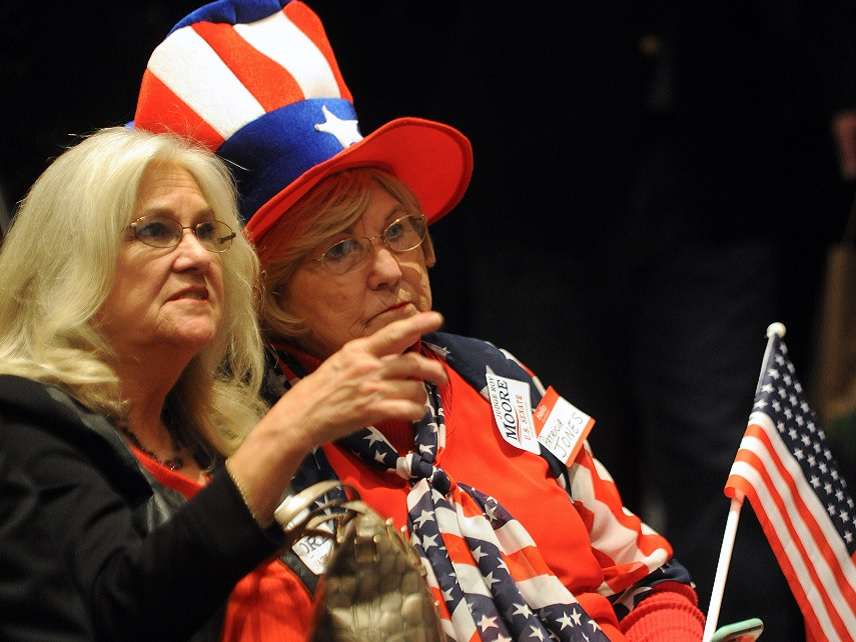If You Want to See the Future of Political Trolling—and Elections—Look to Alabama
A second covert campaign against Judge Roy Moore is revealed, suggesting that voters need to up their media-literacy game, and fast.

If the 2016 elections raised (unjustified) concerns that Russian hackers tipped the presidential race to Donald Trump, the special election in 2017 between Republican Roy Moore and Democrat Doug Jones suggests that the future of political messaging is going to be full of false-flag operations designed to dupe voters.
In December, The New York Times reported on a project in which activists created a Facebook page and posed as conservative Alabamians disgusted by Moore's alleged sexual misconduct toward underage and teenage girls. The idea was to use the page
to try to divide Republicans and even to endorse a write-in candidate to draw votes from Mr. Moore. It involved a scheme to link the Moore campaign to thousands of Russian accounts that suddenly began following the Republican candidate on Twitter, a development that drew national media attention.
"We orchestrated an elaborate 'false flag' operation that planted the idea that the Moore campaign was amplified on social media by a Russian botnet," [an internal report says].
The larger goal, said the head of the project, was to "enrage and energize Democrats" and "depress turnout" on the other side of the aisle. The campaign was orchestrated in part by the group New Knowledge, which itself generated a widely discussed report for the U.S. Senate about the ways in which a Russian troll farm, the Internet Research Agency, attempted to influence the 2016 presidential election. Nobody thinks the Alabama effort, which had a $100,000 budget in a race that cost $51 million in total spending, had any impact.
Now the Times has revealed a second false-flag operation in Alabama. This one was also designed to weaken Roy Moore's support, but by suggesting that the vocal Christian wanted to bring alcohol prohibition back to the Alabama.
The "Dry Alabama" Facebook page, illustrated with stark images of car wrecks and videos of families ruined by drink, had a blunt message: Alcohol is the devil's work, and the state should ban it entirely.
Along with a companion Twitter feed, the Facebook page appeared to be the work of Baptist teetotalers who supported the Republican, Roy S. Moore, in the 2017 Alabama Senate race. "Pray for Roy Moore," one tweet exhorted.
In fact, the Dry Alabama campaign, not previously reported, was the stealth creation of progressive Democrats who were out to defeat Mr. Moore—the second such secret effort to be unmasked. In a political bank shot made in the last two weeks of the campaign, they thought associating Mr. Moore with calls for a statewide alcohol ban would hurt him with moderate, business-oriented Republicans and assist the Democrat, Doug Jones, who won the special election by a hair-thin margin.
More here. Observers say that there's no reason to believe that this campaign had any influence on the outcome of the election either.
But together, the two campaigns suggest the likely future of American politics in an age when many campaign-finance laws have been (rightly) struck down as unconstitutional, independent expenditures continue to grow, and, perhaps most important, social media and technology have created an unparalleled opportunity for more and more of us to create and distribute virtually whatever we want. "Deep fakes"—videos in which people's faces are swapped in almost undetectably onto other people's bodies—aren't just for porn. Last year, comedian Jordan Peele demonstrated just how easy and seamless deep fakes can be when he offered up the spectacle of former President Barack Obama calling Donald Trump "is a total and complete dipshit." (Watch that below.)
As Stewart Baker has noted at The Volokh Conspiracy, our world will soon (if it's not already) be "awash with fake revenge porn, fake human rights atrocities, and fake political scandals." There will be predictable attempts to shut down free speech in the name of preserving electoral integrity in ways that inevitably help incumbents or powerful interests, but digital culture has a way of routing around that sort of thing. Ultimately the only way forward—a way which is perfectly consonant with libertarian values of maximizing freedom and minimizing regulation—is for each of us as individuals to be constantly upping our media-literacy game while also devising new ways to authenticate and vet information sources. If online businesses and retailers have been able to squeeze down fraud, if email providers have mostly gotten rid of spam, and if journalistic outfits maintain readership based on the quality of their work, surely as a society we'll be able to deal with even super-smooth efforts by foreign and domestic agents trying to "hack" our elections through misinformation.
It won't be easy, or smooth, but it will also probably reveal which of us actually believe that people are smart enough to make decisions for themselves and which don't trust individuals to be in charge of their own lives.


Show Comments (50)